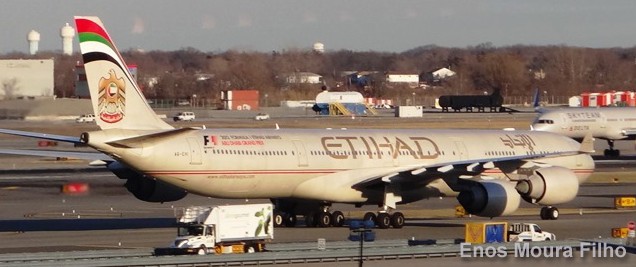Etihad Airways claims to have improved fuel efficiency across all operations by 2.5% in 2016, which represented savings of nearly 190,000 tonnes of CO2 emissions, the equivalent of 1,200 flights between Abu Dhabi and London. The UAE"™s national airline says it is working on several key initiatives to optimise efficiency, both with the aircraft fleet itself and through external collaboration with aircraft manufacturers Boeing and Airbus. These include efforts to reduce the weight of onboard items and investing in new technology to ensure flight crews have the latest information on weather patterns to allow them to plan for optimum fuel efficiency of their aircraft during flight. Airport staff are also supporting efforts to ensure emissions reductions from using ground power instead of auxiliary power units when aircraft are at gates.
"Fuel optimisation is a top agenda item for any successful and sustainable airline, with Etihad Airways no exception," said the carrier"™s Chief Operating Officer, Richard Hill. "There have been some encouraging results during 2016 and I"™m delighted to see so many of our pilots fully engaged with the programme, as this has ensured additional learning opportunities and the identification of new measures that can deliver greater fuel savings in the years ahead. It"™s a vital part of our sustainability efforts and we will continue to look for ways to improve our performance."
With A380 aircraft having a maximum take-off weight of 575 tonnes "“ equivalent to 115 African elephants or 218 Toyota Land Cruisers, pointed out Etihad "“ reducing weight is a vital part of fuel savings. A "˜weight out"™ programme to remove or replace onboard items has led to a fuel burn reduction of 1,100 tonnes of fuel per year, it estimates.
Last month, Etihad signed a contract that will see the Boeing Wind Updates service introduced into its global fleet operations, which is expected to increase efficiency and reduce fuel consumption by leveraging real-time information to improve in-flight aircraft performance based on atmospheric conditions. The service will provide customised, real-time wind and temperature information during every flight anywhere in the world.
"Being aware of real-time wind data and their related conditions will enhance situational awareness on the flight deck, enabling us to fly the most efficient routes possible," explained Hill.
More current and accurate weather data is expected to reduce fuel consumption by an average of 90-180 kgs of fuel per flight…



